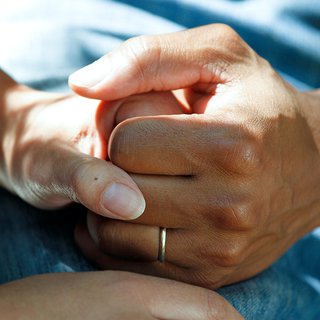The emotional impact of a poor prognosis
Sue’s husband John was told there was no treatment for his rare form of lymphoma. But a treatment was found, and he is still here. Sue talks about how they have dealt with the stress of a poor prognosis.

This story is a true account of a family’s experience of living with blood cancer, but names have been changed to protect their privacy.
My husband John has been absolutely brilliant at coping with blood cancer and his treatment. For a while, he went from a never-sitting-down, always busy, always fixing, always with a plan type of mentality to life on a sofa watching crap TV. There was such an acute contrast between life before and life after his diagnosis I think he had no choice but to accept this new life and adjust quickly. Plus he didn’t have the energy to care much at first.
Our situation was the worst you could imagine at diagnosis. It was the run-up to Christmas and although they didn’t quite say it, it was clear they really thought John wouldn’t make it that far. His body went into survival mode but luckily, they found a treatment that’s kept him alive.
I sometimes wonder if it’s easier being the person with blood cancer than the person next to them, because when you’re fighting for your life it’s all about you, and your body and your head, but for the other person, it’s about managing the everyday things – picking up the children, cleaning, getting food ready – while dealing with the other stuff too.
Nothing left unsaid
John was fine in the daytime. Then we would go to bed, we’d be talking and he’d go quiet for a while and then he’d randomly come out with, “I’d love to die at home, but I’m not sure I could do that to you,” or “I wonder if EasyJet would take to me Ireland to be buried with my dad?” And then he would sleep, and I’d weep all night. I’d be thinking, “I’m going to have to enquire about the graveyard and how that works. Who do I ask these questions, how do I find out? If he dies in this bed, would I keep it?”
He didn’t want there to be anything left unsaid, so I had to support him and be there, because that’s what you do, and I’d expect him to do the same for me. But he’d get up and face a new day while my heart was in pieces. And that was difficult.
He has been amazing – the grace with which he deals with it, the humour. Not everyone appreciates black humour, but it’s entirely your right to use it if it helps.
I once went to a funeral and these two ladies were making really inappropriate jokes. I was thinking, how awful, but then they explained they were terminally ill. And I thought, “Oh you get to say anything you want actually, because you’re living with this.”
So if someone talks to you about when they’re gone, don’t push that away. If they ask you to take care of something just say, “I appreciate that pal, of course I’ll cut the grass,” because what they really need to know is that the grass will get cut.
People talk about being brave, but you just deal with the situation, there are no accolades because no one wants to be here. You can look for the positives, but nobody wants this situation.
My own emotional health
I’d love to say I look after myself, but at times I’ve just keep going until I can’t go any more and I’ve been forced to stop. I’ve done that on too many occasions since John’s diagnosis and I’ve ended up unwell physically and emotionally.
I don’t think time out applies in certain situations. I don’t have family close by to help so how could I choose to be anywhere other than where I’m needed? If John is having a day when he’s exhausted, why would I be somewhere else when the place I want to be is at home with him, watching something, having a laugh or chatting?
But it’s important to be aware when you do get overwhelmed and know what support is out there. I found people were always asking about my husband and child and would say, “How are they doing? It must be so difficult for them both.” I was thinking, “Well they’re doing as well as they’re doing because I’m a wreck, because my life’s stopped. John will be away from this and won’t have to see me grieve and his child break.” It got to the darkest of times and I wanted it all to stop – all the stress, the pain, the noise. Everything. I reached out for crisis support and was kept safe in that moment. I think there are more people who experience that than will ever admit to it.
You have to know that you don’t have to be perfect. It’s actually OK to never know what’s the right thing to do. To feel conflicted, to always feel you’re juggling and not to like it.
Now I walk when I can, and I listen to the radio or music or just silence and I go over whatever’s in my head, and then I present that I’m OK to the rest of the world. And I am, because I’ve had half an hour away. You have to do what works.
We hope this story will help people in a similar situation to feel they are not alone with difficult feelings. But if you find it triggering, please contact our Support Service to talk things through. It may help to look at our information about how to take care of yourself while caring for someone with blood cancer.
You can also find people who’ll understand how you feel on our online community forum. See these threads where family members share their feelings and experiences.


